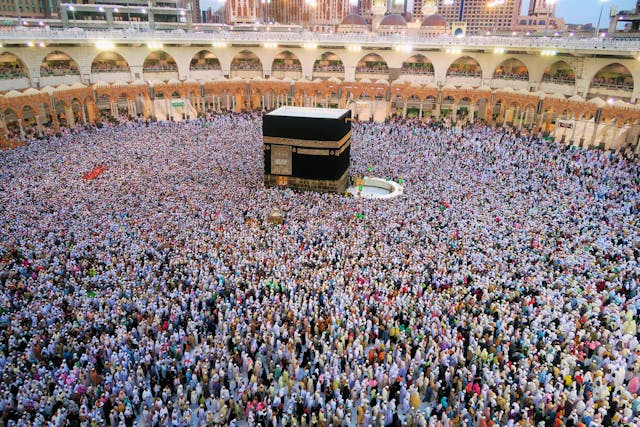As the crescent moon signals the end of Ramadan, Muslims worldwide prepare to celebrate Eid al-Fitr, a joyous occasion that marks the culmination of a month of fasting, prayer, and spiritual reflection. Beyond its festive ambiance, Eid al-Fitr carries profound significance, emphasizing the principles of generosity, compassion, and community solidarity.
At the core of this celebration is Zakat, an obligatory form of charity that serves as a means of purifying wealth and uplifting those in need. Let’s delve into the essence of Eid al-Fitr, the importance of Zakat, and how you can contribute to transformative change through organizations like Islamic Relief USA.
Understanding Eid al-Fitr
Eid al-Fitr, often referred to as the “Festival of Breaking the Fast,” is one of the most significant holidays in the Islamic calendar. It falls on the first day of Shawwal, the month following Ramadan, and is expected to begin Wednesday, April 10, 2024. The holiday is celebrated with great enthusiasm and joy by Muslims around the world. The day begins with a special prayer known as Salat al-Eid, performed in congregation at mosques or outdoor prayer grounds. Following the prayer, Muslims gather with family and friends to partake in festive meals, exchange gifts, and engage in acts of charity.
The significance of Eid al-Fitr
Eid al-Fitr holds both religious and cultural significance for Muslims. It serves as a time of spiritual renewal and gratitude, as well as a celebration of the resilience and self-discipline demonstrated throughout the month of Ramadan. The holiday is an opportunity for Muslims to come together in unity and solidarity, bridging divides and fostering a sense of community and belonging. Moreover, Eid al-Fitr emphasizes the importance of compassion and generosity toward those less fortunate, highlighting the obligation to support and uplift vulnerable members of society.
The practice of Zakat
During the holy month of Ramadan and Eid al-Fitr, Muslims are encouraged to fulfill two types of Zakat: Zakat al-Fitr and Zakat al-Mal.
Zakat al-Fitr
Also known as “Fitrana” or “Fitr charity,” Zakat al-Fitr is a form of charity that is obligatory upon every Muslim, regardless of their wealth. It is typically given before the Eid prayer and serves as a means of purifying one’s fast and ensuring that those in need can also enjoy the festivities of Eid. The amount of Zakat al-Fitr is equivalent to the cost of staple food items, such as wheat, barley, dates, or raisins, and is calculated based on the current market value. By giving Zakat al-Fitr, Muslims express gratitude for the blessings of Ramadan and extend a helping hand to those less fortunate in their communities. Consult your local imam or scholar for specific calculations of the Zakat al-Fitr amount.
Zakat al-Mal
Zakat al-Mal, or “wealth Zakat,” is the traditional form of Zakat that is given on an annual basis by Muslims who meet the Nisab threshold (the minimum amount of wealth required for Zakat eligibility). Unlike Zakat al-Fitr, which is specific to Ramadan and Eid al-Fitr, Zakat al-Mal can be given at any time of the year. It is calculated as 2.5% of one’s savings and assets, including cash, gold, silver, investments, and business profits, and is distributed to those in need, as prescribed by Islamic law.
During Ramadan and Eid al-Fitr, many Muslims choose to fulfill their Zakat al-Mal obligations, in addition to Zakat al-Fitr, as a way of maximizing their charitable giving and seeking the blessings of the holy month. IRUSA offers a helpful Zakat calculator to help you assess your Zakat.
The impact of both types of Zakat with Islamic Relief USA
IRUSA recognizes the importance of both Zakat al-Fitr and Zakat al-Mal in fulfilling the obligation of charity and making a positive impact in the lives of those in need. Through its Zakat-eligible programs and initiatives, IRUSA ensures that both forms of Zakat are utilized effectively and transparently to support vulnerable individuals and communities.
Whether it’s providing immediate relief to families struggling with poverty and hunger or implementing long-term development projects to empower communities to lift themselves out of poverty, Zakat contributions to IRUSA make a lasting difference in the lives of those most in need. By giving both Zakat al-Fitr and Zakat al-Mal through IRUSA, Muslims can maximize the impact of their charitable giving and fulfill their obligations to their fellow human beings, as prescribed by Islamic teachings.
Beyond Zakat: Embracing the spirit of Sadaqah
In addition to fulfilling Zakat obligations, Muslims are encouraged to engage in voluntary acts of charity, known as Sadaqah, during Eid al-Fitr and throughout the year. These voluntary donations, whether big or small, serve as expressions of gratitude and compassion, further reinforcing the spirit of giving and solidarity within the community. By embracing the principles of Zakat and Sadaqah, Muslims can embody the true essence of Eid al-Fitr, fostering a culture of generosity, empathy, and social responsibility.
Eid Mubarak!
As Muslims around the world come together to celebrate Eid al-Fitr, let us remember the importance of giving back to those in need. Let’s embrace the spirit of giving and compassion and reaffirm our commitment to building a more just, equitable, and compassionate world for all. Eid Mubarak!
